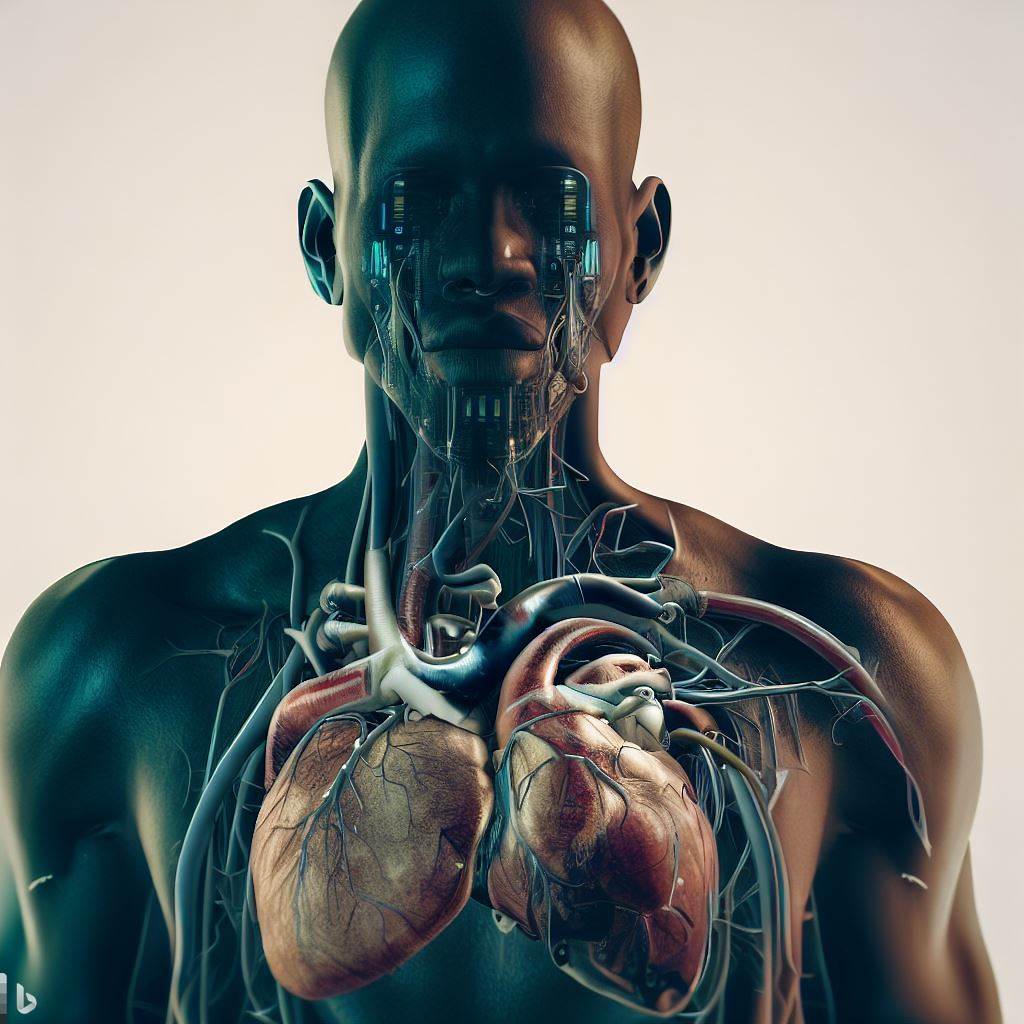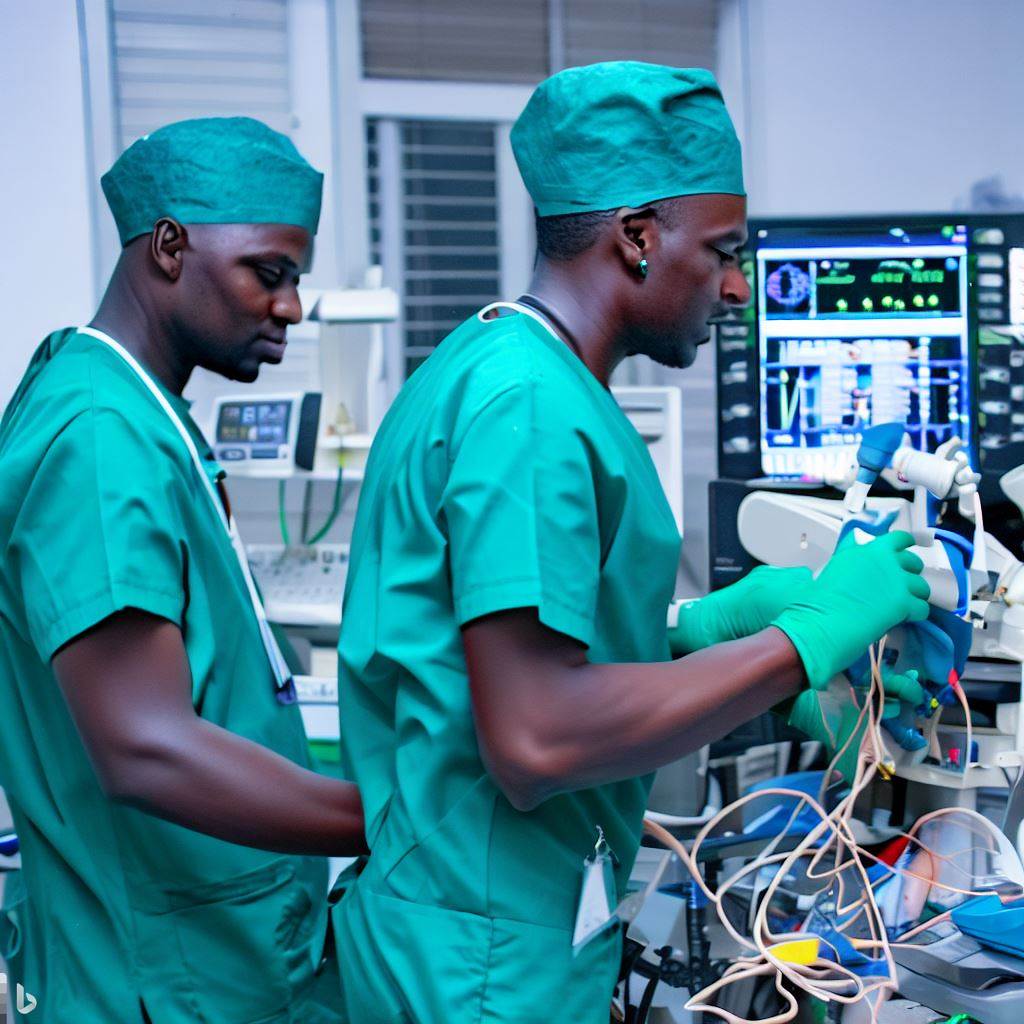Introduction
Becoming a cardiovascular technologist in Nigeria plays a crucial role in the healthcare system, and its importance cannot be overstated. This blog post will focus on the requirements for becoming a cardiovascular technologist.
Cardiovascular technologists are specialized healthcare professionals trained to assist in the diagnosis and treatment of heart and blood vessel diseases. They perform various diagnostic tests and procedures that help doctors accurately assess a patient’s cardiovascular health.
The cardiovascular technologist uses sophisticated medical equipment to conduct tests like echocardiograms, electrocardiograms, and stress tests. These tests provide crucial information that aids in the early detection and treatment of heart conditions.
With the increasing prevalence of cardiovascular diseases in Nigeria, the role of cardiovascular technologists has become even more critical.
Cardiovascular technologists work closely with cardiologists and cardiovascular surgeons to provide accurate data that guides treatment decisions and helps monitor patients’ progress. Their expertise helps physicians make informed decisions and ensures that patients receive appropriate and timely care.
Moreover, cardiovascular technologists play a vital role in patient education, explaining procedures and assisting patients in understanding their cardiovascular health. They are compassionate caregivers who provide emotional support to patients during testing and treatment procedures.
Generally, cardiovascular technologists are invaluable members of the healthcare system in Nigeria. Their specialized skills and expertise in diagnosing and treating cardiovascular diseases contribute significantly to improving patient outcomes.
As the demand for cardiovascular healthcare services continues to grow, the role of cardiovascular technologists will continue to be essential in ensuring optimal patient care.
Educational Requirements:
Educational requirements are an essential aspect when considering a career in cardiovascular technology in Nigeria. Aspiring cardiovascular technologists need to acquire specific qualifications, degrees, certifications, and additional training to excel in this field.
Educational Qualifications
- A high school diploma or its equivalent is the basic requirement to pursue a career as a cardiovascular technologist in Nigeria.
- After high school, one must enroll in a recognized tertiary institution to pursue a bachelor’s degree.
- Prospective technologists should consider studying relevant science-based subjects such as biology, chemistry, anatomy, physics, and mathematics.
- Attaining a minimum GPA, as specified by the tertiary institution, is important to gain admission into a cardiovascular technology program.
Specific Degree or Certification
Individuals interested in becoming cardiovascular technologists must complete a Bachelor of Science (B.Sc.) degree in Cardiovascular Technology. The B.Sc. program provides students with specialized knowledge and skills required to work in this field.
The curriculum comprises courses that provide a solid foundation in cardiovascular anatomy, physiology, pathology, medical ethics, and patient care.
Students also gain practical experience through clinical rotations in cardiac catheterization labs, echocardiography labs, and stress testing laboratories.
Additional Courses or Training
To further augment their skills and improve employment prospects, cardiovascular technologists may consider pursuing additional certification or training.
One such certification is the Registered Cardiovascular Invasive Specialist (RCIS) credential offered by the Cardiovascular Credentialing International (CCI). This certification validates an individual’s expertise in the field and enhances their professional credibility.
Courses in advanced cardiac life support (ACLS) and basic life support (BLS) are also recommended to handle emergency situations effectively.
While educational qualifications, degrees, and certifications are crucial, acquiring practical experience is equally important for cardiovascular technologists in Nigeria. Hands-on training enables individuals to apply their theoretical understanding to real-life scenarios.
It is advisable for aspiring cardiovascular technologists to seek internships or mentorship opportunities in reputable hospitals, clinics, or medical institutions. These practical experiences foster skill development and provide exposure to different diagnostic and imaging technologies.
Furthermore, joining professional associations and attending conferences and seminars related to cardiovascular technology can be beneficial. Such events provide networking opportunities with experienced technologists, opening doors to career advancement and staying updated with the latest industry trends and advancements.
In a nutshell, a career as a cardiovascular technologist in Nigeria requires individuals to meet specific educational requirements. Obtaining a bachelor’s degree in Cardiovascular Technology and additional certifications or training is essential.
Practical experience through internships and continuous professional development plays a vital role in becoming a successful cardiovascular technologist. By fulfilling these requirements, individuals can thrive in this rewarding and critical healthcare profession.
Read: Aviation in Nigeria: High-Demand Professions
Skills and Abilities for Becoming a Cardiovascular Technologist in Nigeria
Being a cardiovascular technologist is a complex and demanding profession that requires a range of technical and interpersonal skills. If you are considering a career in this field, it is essential to possess the following abilities:
Technical Skills
- Operate and maintain diagnostic equipment used in cardiovascular procedures.
- Conduct tests and analyze the results to assess the patient’s cardiovascular health.
- Perform electrocardiograms (ECGs) and ultrasounds to identify abnormalities.
- Assist physicians during cardiac catheterization procedures.
- Handle and administer medications and intravenous fluids as required.
- Keep accurate records of patients’ medical history and test results.
Read: Step-by-step Guide to Becoming a Nursing Assistant in Nigeria
Interpersonal Skills
- Effectively communicate and empathize with patients to create a calm and supportive environment.
- Collaborate with other healthcare professionals to provide comprehensive patient care.
- Educate patients and their families about cardiovascular procedures and necessary lifestyle changes.
- Explain test procedures to alleviate any fears or concerns patients may have.
- Adapt communication style to diverse backgrounds and cultural beliefs of patients.
- Show compassion and sensitivity towards patients’ emotional and physical well-being.
Problem-Solving Skills
- Analyze and interpret complex data obtained from diagnostic tests accurately.
- Determine the appropriate course of action when faced with unusual or critical situations.
- Solve technical problems related to diagnostic equipment during procedures.
- Maintain a meticulous attention to detail to ensure accurate test results.
- Make decisions quickly and efficiently during emergency situations.
Physical Stamina
- Stand for long periods and maintain physical endurance during lengthy procedures.
- Lift and move heavy equipment and assist in the transfer of patients when necessary.
- Wear protective clothing and follow strict safety protocols to prevent exposure to radiation.
- Maintain a steady hand and excellent hand-eye coordination for precise test administration.
- Remain focused and alert during high-pressure situations.
Continuous Learning
- Pursue ongoing professional development to stay updated on the latest advancements in cardiovascular technology.
- Attend workshops, conferences, and seminars to enhance technical skills and stay informed.
- Take part in research studies and contribute to the development of new treatment methods.
- Stay up-to-date with changes in healthcare regulations and best practices.
- Seek opportunities for further specialization or advanced certifications within the field.
Ultimately, becoming a cardiovascular technologist in Nigeria requires a combination of technical expertise, effective communication, problem-solving abilities, physical stamina, and a commitment to continuous learning.
With the right skills and abilities, you can contribute significantly to the diagnosis and treatment of cardiovascular diseases, making a positive impact on patients’ lives.
Read: The Future Outlook of Aviation Jobs in Nigeria

Licensing and Certification
Cardiovascular technologists in Nigeria must go through a licensing and certification process. The regulatory bodies responsible for granting licenses and certifications include:
- National Board for Technical Education (NBTE)
- Medical and Dental Council of Nigeria (MDCN)
- Health Records Officers Registration Board of Nigeria (HRORBN)
To practice as a cardiovascular technologist in Nigeria, it is important to maintain valid credentials.
Importance of maintaining valid credentials in this field
Being licensed and certified demonstrates competence and adherence to professional standards. It instills confidence in patients and their families, ensuring quality care is provided.
Maintaining valid credentials also shows commitment to ongoing professional development and education. Certifications for cardiovascular technologists in Nigeria can be obtained through relevant associations.
The Nigerian Cardiac Society (NCS) offers certifications for various cardiovascular subspecialties. These certifications contribute to the standardization and recognition of expertise in the field.
Obtaining certifications enhances career opportunities and increases earning potential. Employers often prioritize hiring individuals with valid certifications. Having certifications can also lead to professional networking opportunities. Certifications require fulfilling specific criteria, including educational qualifications and clinical experience. Cardiovascular technologists need to pass rigorous examinations to obtain certifications.
Continuing education and periodic recertification are necessary to maintain valid credentials. Recertification ensures professionals stay updated with advancements and changes in the field.
Basically, obtaining licenses and certifications is a crucial step for cardiovascular technologists in Nigeria. The National Board for Technical Education, Medical and Dental Council of Nigeria, and Health Records Officers Registration Board of Nigeria play significant roles in granting these credentials.
Maintaining valid credentials demonstrates competence, ensures quality care, and opens doors to career advancement. By obtaining certifications, cardiovascular technologists showcase their expertise, increase their employability, and contribute to the standardization of the profession.
Continuing education and recertification are necessary for professionals to stay current in the ever-evolving field of cardiovascular technology.
Read: A Beginner’s Guide to Aviation Careers in Nigeria
Professional Experience
Practical experience is vital for the career advancement of cardiovascular technologists in Nigeria. Internships, clinical rotations, and training programs offer hands-on opportunities to apply theoretical knowledge in real-world scenarios.
Internships provide short-term supervised positions in professional settings. Clinical rotations offer exposure to different departments and healthcare professionals, broadening understanding. Comprehensive training programs focus on specific cardiovascular areas, including diagnostic tests and procedures. Hands-on experience benefits technologists in various ways.
Firstly, it refines technical skills by performing tests and operating equipment with patients, enhancing proficiency and accuracy. It also deepens knowledge of cardiovascular conditions and treatment options, bridging theory and practice.
Moreover, practical experience fosters critical thinking and problem-solving skills. Technologists analyze test results, detect abnormalities, and suggest further evaluation or treatment. Communication and teamwork abilities improve, benefiting interactions with diverse patients and healthcare professionals.
Additionally, hands-on experience reveals the realities of the profession, including its pace, demands, and challenges. Aspiring technologists can assess their suitability and make informed career decisions.
To summarize, internships, clinical rotations, and training programs are essential for cardiovascular technologists in Nigeria. These experiences enhance skills, knowledge, critical thinking, communication, and decision-making abilities, effectively preparing individuals for the demands of the profession.
Read: Emerging Opportunities in the Aviation Industry of Nigeria
Job Opportunities and Pay
As cardiovascular diseases continue to be a leading cause of death in Nigeria, the demand for cardiovascular technologists has increased. This presents several job opportunities for individuals interested in this field.
Potential Job Opportunities
- Hospitals: Hospitals are the primary employers of cardiovascular technologists in Nigeria. These technologists play a crucial role in assisting doctors in diagnosing and treating cardiovascular diseases.
- Diagnostic Centers: Diagnostic centers also hire cardiovascular technologists to perform tests and procedures related to heart health. These centers are becoming more common throughout the country.
- Research Institutions: Some research institutions in Nigeria employ cardiovascular technologists to assist in studies and clinical trials focused on cardiovascular diseases and treatments.
- Private Practices: Private practices and clinics may hire cardiovascular technologists to provide specialized cardiac services to their patients.
- Government Health Centers: Various government health centers recruit cardiovascular technologists to enhance their healthcare services and meet the growing needs of the population.
Healthcare Settings
Cardiovascular technologists can work in a variety of healthcare settings, including:
- Hospitals: Technologists can find employment in both public and private hospitals, catering to a wide range of patients.
- Specialty Cardiac Centers: These specialized centers focus solely on cardiac care, providing opportunities for cardiovascular technologists to work alongside experts in the field.
- Teaching Hospitals: Teaching hospitals employ cardiovascular technologists to assist in training future medical professionals, making the job dynamic and rewarding.
Average Salary Range
The average salary range for cardiovascular technologists in Nigeria depends on various factors such as experience, qualifications, and the employing institution. On average, cardiovascular technologists can expect to earn between N400,000 to N800,000 per year.
However, it is important to note that salaries may vary significantly based on location, level of expertise, and the overall economic situation of the country.
Although the salary range might not be as high as in some other healthcare professions, cardiovascular technologists find their work financially rewarding, particularly because of the growing demand in the field.
The job opportunities for cardiovascular technologists in Nigeria are expanding as the country faces an increasing burden of cardiovascular diseases. Employment prospects are available in hospitals, diagnostic centers, research institutions, private practices, and government health centers.
With the average salary range being between N400,000 to N800,000 per year, cardiovascular technologists can enjoy a reasonable income while making a valuable contribution to improving cardiac healthcare in Nigeria.
As the healthcare sector continues to evolve, the role of cardiovascular technologists will remain crucial, ensuring early detection, accurate diagnosis, and effective treatment of cardiovascular diseases for a healthier nation.
Read: The Path to Becoming a Surgeon in Nigeria
Uncover the Details: Role of Physical Therapists in Nigeria’s Healthcare
Challenges and Rewards of Being a Cardiovascular Technologist in Nigeria
Challenges
- Limited access to specialized training and educational programs for cardiovascular technologists.
- Inadequate resources and outdated equipment in healthcare facilities.
- High patient load leading to long working hours and increased stress levels.
- Potential exposure to infectious diseases and other workplace hazards.
- Limited career advancement opportunities in the field of cardiovascular technology.
Potential workplace hazards or stress factors
- Exposure to radiation during imaging procedures.
- Physical strain from lifting and moving heavy equipment or patients.
- High-pressure work environment with critical and time-sensitive procedures.
- Emotional stress due to dealing with patients’ life-threatening conditions.
- Potential risk of contracting contagious diseases from patients.
Personal satisfaction and rewards:
- The opportunity to make a significant impact on patients’ lives by aiding in their diagnosis and treatment.
- Job satisfaction derived from performing intricate procedures with precision and accuracy.
- The ability to work as part of a multidisciplinary team, collaborating with other healthcare professionals.
- Career stability and job security in an in-demand medical field.
- Continuous learning and professional growth through technological advancements in cardiovascular medicine.
- The fulfillment of knowing that every day brings new challenges and opportunities to learn.
- The rewarding experience of building long-lasting relationships with patients and their families.
Being a cardiovascular technologist in Nigeria presents challenges and rewards. Limited access to training programs and resources, coupled with high patient loads, hinders career advancement.
Outdated equipment affects quality care. Hazards like radiation exposure and physical strain add stress. However, technologists find personal satisfaction in impacting patients’ lives and performing intricate procedures with precision.
Collaborating with healthcare professionals and supporting patients and families is rewarding. Job stability and security in the growing healthcare sector, along with continuous learning opportunities, contribute to personal and professional growth.
Despite challenges, the fulfillment of making a difference and being part of a vital healthcare team makes cardiovascular technology a rewarding career choice in Nigeria.
Conclusion
Becoming a cardiovascular technologist in Nigeria requires rigorous education and training. It involves obtaining a bachelor’s degree in cardiovascular technology and acquiring relevant certifications.
The job prospects are promising, given the increasing prevalence of cardiovascular diseases in the country.
To successfully pursue a career in this field, individuals interested in this profession should research further to understand the specific requirements and pathways available. They should also be prepared to commit to continuous learning and professional development.
Considering the importance of cardiovascular health in Nigeria, becoming a cardiovascular technologist can be a rewarding career choice.




